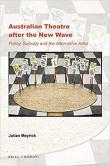 7768257761222851677.jpg
7768257761222851677.jpg
 Australian Theatre after the New Wave : Policy, Subsidy and the Alternative Artist
multi chapter work
Australian Theatre after the New Wave : Policy, Subsidy and the Alternative Artist
multi chapter work
 7768257761222851677.jpg
7768257761222851677.jpg
 Australian Theatre after the New Wave : Policy, Subsidy and the Alternative Artist
multi chapter work
Australian Theatre after the New Wave : Policy, Subsidy and the Alternative Artist
multi chapter work
'In Australian Theatre after the New Wave, Julian Meyrick charts the history of three ground-breaking Australian theatre companies, the Paris Theatre (1978), the Hunter Valley Theatre (1976-94) and Anthill Theatre (1980-94). In the years following the controversial dismissal of Gough Whitlam's Labor government in 1975, these 'alternative' theatres struggled to survive in an increasingly adverse economic environment. Drawing on interviews and archival sources, including Australia Council files and correspondence, the book examines the funding structures in which the companies operated, and the impact of the cultural policies of the period. It analyses the changing relationship between the artist and the State, the rise of a managerial ethos of `accountability', and the growing dominance of government in the fate of the nation's theatre. In doing so, it shows the historical roots of many of the problems facing Australian theatre today.'
Source: Publisher's blurb.